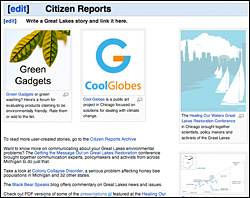Since its launch in January 2007, the Great Lakes Wiki continues to thrive and grow in cyberspace. The wiki was initially conceived as a repository for environmental information about the Great Lakes Areas of Concern, the official name given to 43 geographic and aquatic locations, which the U.S. and Canada agreed are threatened by industrial contamination. However, the creators of the wiki soon broadened the scope of the project to include other regions and other aspects of the Great Lakes to attract more writers.
 The site is now divided into six major categories: culture, recreation, commerce, ecology, geography and areas of concern (AOCs). Each category has elements that can be expanded, eliminated or modified. Each section can contain news stories posted by anyone. Those news stories can also be linked off the “citizen reports” section of the main page.
The site is now divided into six major categories: culture, recreation, commerce, ecology, geography and areas of concern (AOCs). Each category has elements that can be expanded, eliminated or modified. Each section can contain news stories posted by anyone. Those news stories can also be linked off the “citizen reports” section of the main page.
According to project leader Dave Poulson, associate director of Michigan State University’s Knight Center for Environmental Journalism, “The Great Lakes Wiki has proven to be a great platform for students to experiment with new forms of journalism.” He cited these examples from the Wiki:
- A section on the Rouge River features stories, still images, a timeline and video of citizens describing the environmental challenges the river faces. And in a demonstration of how content can be easily repurposed on the site, a link was forged between a video segment describing the Rouge’s invasive species and the entry describing invasive species.
- A piece under the geography section demonstrates how intensely a local river can be examined. It consists of stories about the Red Cedar River, a river that runs through the MSU campus. The stories are linked to each other and relevant material elsewhere on the Web.
- Students produced a video about climate change (modeled after the Washington Post’s “OnBeing” series) in which they edited down interviews with participants at a climate change symposium on campus and strung the clips together to answer user-selected questions about this complex environmental issue.
- Also, high school students participating in an environmental education program recently spent a week in the Upper Peninsula, where they took photos and kept journals about the trip. These elements will form a wiki page that combines their contributions with a traditional story.
As of November 2007, the wiki had 300 registered users. Among the frequent visitors is an administrator at Wikipedia who has taken a particular interest in the site. “We gave him system operator status on the Great Lakes Wiki and he has been active in creating templates, clearing graffiti and enforcing a wiki way of doing things,” says Poulson. “That volunteered interest by someone with sophisticated wiki skills is an example of how sites like this can leverage expertise that otherwise would not be tapped.”
From September to November, the site received 10,000 unique visits, an average of 117 visits per day.
 The number of Great Lakes organizations with profiles on the site has expanded to 40, offering a greater awareness of what groups with similar interests are doing.
The number of Great Lakes organizations with profiles on the site has expanded to 40, offering a greater awareness of what groups with similar interests are doing.
In April, the wiki was designated the “site of the month” by the Great Lakes Information Network, a coalition of more traditional Great Lakes information providers.
Encouraging contributions from citizens and other groups to the Great Lakes Wiki is a priority. Video help files were created with Camtasia software and additional help documents, such as a how-to on shooting and uploading video, are being developed for online and print distribution.
This summer, Great Lakes Wiki hired a paid media coordinator to “prime the wiki pump,” generating and modeling content for the site by traveling throughout the Great Lakes basin, teaching people how to use it. From the annual meeting of the citizen coalition Great Lakes United in Toronto to a Michigan Energy Fair in Manistee, these events help the wiki recruit and train a diverse pool of contributors and readers. They even attended a Grandparents University at Michigan State University in East Lansing where 20 pairs of grandparents and grandchildren shared a computer as they learned to contribute vacation memories and other information to the Great Lakes Wiki.
 One strategy for expanding awareness is the creation of a Great Lakes Wiki group on Facebook. As of November 2007, it had 64 members. Wiki promoters also used Meetup.com and various listservs to generate interest in training sessions. Numerous mailings to environmental, citizen and educational institutions have begun to pay off. “A journalism professor at Kent State University in Ohio has contacted us because she is developing curriculum for nontraditional investigative reporting techniques to be integrated in several classes,” said Poulson. “It is our hope that the Great Lakes Wiki becomes a platform for students taking classes at other journalism programs in the Great Lakes region.”
One strategy for expanding awareness is the creation of a Great Lakes Wiki group on Facebook. As of November 2007, it had 64 members. Wiki promoters also used Meetup.com and various listservs to generate interest in training sessions. Numerous mailings to environmental, citizen and educational institutions have begun to pay off. “A journalism professor at Kent State University in Ohio has contacted us because she is developing curriculum for nontraditional investigative reporting techniques to be integrated in several classes,” said Poulson. “It is our hope that the Great Lakes Wiki becomes a platform for students taking classes at other journalism programs in the Great Lakes region.”



